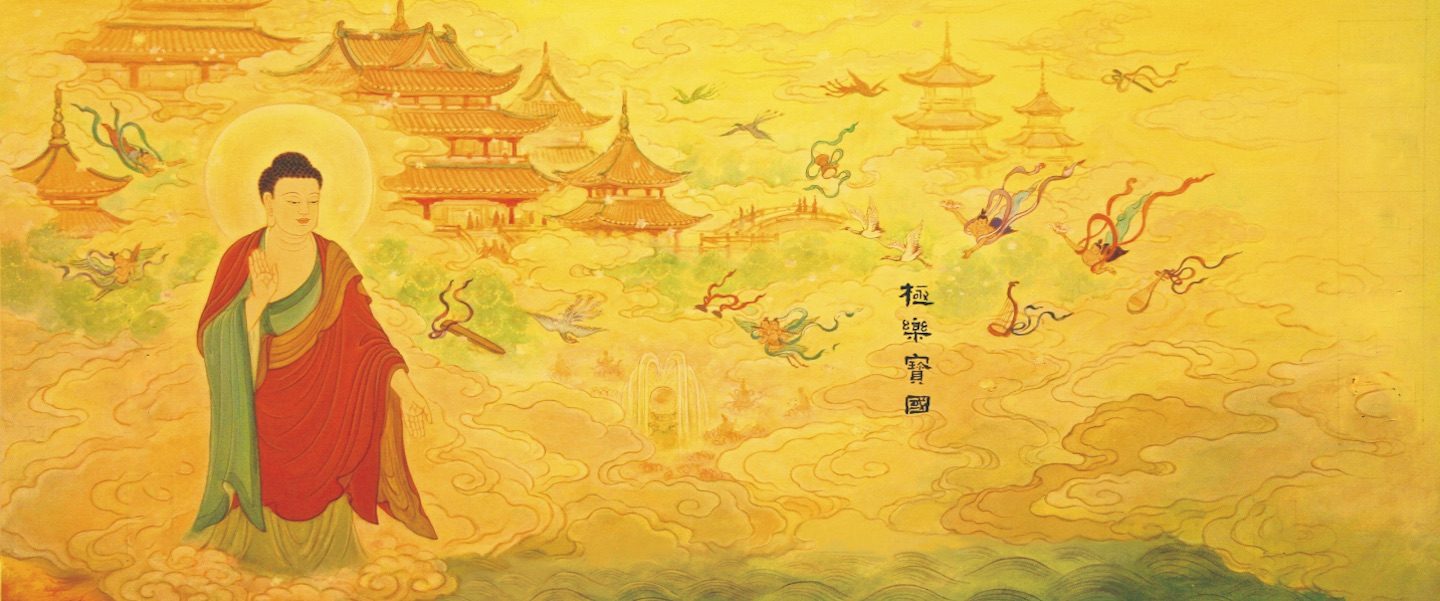Chapter I: Preface
Core of the Amitabha Sutra
One cannot attain birth in that land with few virtuous roots and meritorious blessings as causal conditions.
If a good man or woman hears of Amitabha Buddha and holds fast to his name for one day, for two days, for three days, for four days, for five days, for six days, for seven days, single-mindedly and without deviation, when that person approaches the point of death, Amitabha Buddha and the sacred assembly will appear before him.
When death comes, his mind will not be severely confused. He will at once gain rebirth in Amitabha Buddha’s Land of Bliss.
Chinese:
不可以少善根福德因緣得生彼國。
若有善男子、善女人,聞說阿彌陀佛,執持名號,若一日,若二日,若三日,若四日,若五日,若六日,若七日,一心不亂。其人臨命終時,阿彌陀佛,與諸聖眾,現在其前。
是人終時,心不顛倒,即得往生,阿彌陀佛,極樂國土。
Composed of less than a hundred words, this passage of the Sutra has illustrated the right way to attain rebirth in the Land of Bliss, and is the core of the whole Amitabha Sutra. It is very important; but also often misunderstood. Once misunderstood, the meaning of the whole Sutra will deviate, and the promise of rebirth cannot be fulfilled.
Three Points of Reference
In order to assure a correct understanding of the scripture, let’s establish the following fundamental points first:
- Taking Master Shandao’s Pure Land teachings as our fundamental guidance.
- Tying back to the other two sutras of the “Three Pure Land Scriptures”, i.e. the Infinite Life Sutra and the Contemplation Sutra, in exposition, particularly the 18th Vow: Rebirth through Amitabha Recitation of the Forty-eight Vows.
- Using real life stories as proof, and also some analogies.
Right Cause and Right Effects
This scripture relates in doctrines to “removing non-causes, choosing the right cause, and proclaiming the right effects”, from the mentality of the average follower, there exist the “three major afflictions and two doubts”.
- Removing non-causes: The scripture says that the Land of Bliss is a magnificent realm and it is not possible for beings with few virtuous roots and meritorious blessings to gain rebirth there. As “few virtuous roots and meritorious blessings” is non-cause, it should be removed first, so that we can put aside irrelevant concerns and move forward.
- Choosing the right cause: “Holding fast to His Name, gaining rebirth at once.” “Holding fast to His Name” is the right cause. Right cause means: (i) a correct and not misunderstood cause; (ii) a pure and not mixed cause; (iii) a direct and not crooked cause; and also (iv) an assured cause of rebirth that rules out any uncertainty.
- Proclaiming the right effects: Every cause has its effect. Holding fast to His Name is the cause, which will have two effects: (i) that at the point of death, Amitabha Buddha and the sacred assembly will come forth to receive the practitioner; and (ii) that the mind will not be severely confused, and immediately gaining rebirth
Three Major Afflictions
This passage is critical to the Amitabha Sutra. If we follow Master Shandao’s exposition, everyone will be able to do it, and attain rebirth in the Land of Bliss. If one is unable to correctly understand it, the mind will be afflicted. The more they recite the Amitabha Sutra, the more fears will overwhelm them. Cultivating in a misguided way will result in increasing afflictions to the point of giving up, and even the abandonment of the Pure Land practice .
What are the afflictions?
First, “abundant virtuous roots”: Rebirth requires an abundance of virtuous roots, and who would dare to guarantee that they have enough virtuous roots? Without enough virtues, one cannot attain rebirth. This is a major affliction.
The second affliction, “single-mindedly and without deviation”: There is a Chinese idiom saying that a farmer who was hurt by a tiger “grows pale at the mention of a tiger”. The mention of “single-mindedly and without deviation” also makes almost every practitioner panic. Our illusory thoughts fly all the time, and the mind is just like riding a wild horse or a rabid elephant; it cannot be harnessed by any means, which means one cannot enter the state of mindfulness meditation at all. What can I do about this? Can I attain rebirth without harnessing my mind? That is another affliction!
The third affliction, “mind will not be severely confused”: “When death comes, the mind ought not to be severely confused…….; how can we guarantee that at the point of death?” We never know when we will die or under what circumstances. Nowadays, accidents and disasters such as mining calamities, marine perils, accidents in aviation, car crashes, shipwrecks…… happen from time to time. Moreover, having cerebral hemorrhage, heart attack, persistent vegetative state, stroke……, fatal falls, dying in a fire, death by drowning, and the likes may happen without any prior warning. In case that happens to me, can I hold onto the right mindfulness (reciting Amitabha’s name) till my final breath?
All these three afflictions are the most stressful, just like three huge stones weighing down on our chest.
Two Doubts
There are also two doubts.
The first is about “a good man or woman”: Can we count ourselves among good men or good women? “Is it true that only good beings will attain rebirth? I more or less did wicked things; I ran a restaurant and killed a lot of living beings; I defrauded, bullied, put down, or hurt others; I made money that I shouldn’t have made; I came up with ideas that I shouldn’t have. With all these bad karma, am I still qualified for rebirth by Amitabha recitation?” That is the first doubt.
The second one is about “for one day …… for seven days”: “Do I just recite for just one day or for seven days?”
If one cannot correctly understand these scriptures, it will just be like navigating in a fog, and the path towards rebirth will be full of difficulties and dangerous obstacles.
